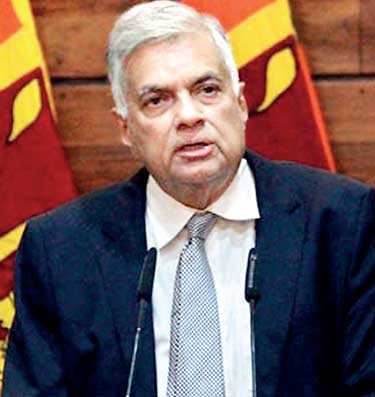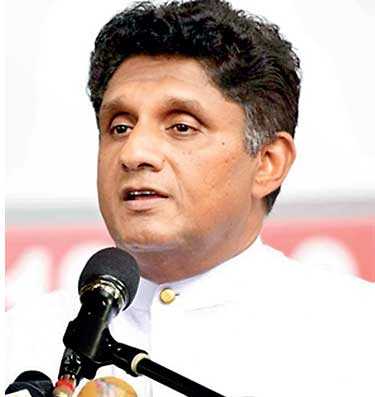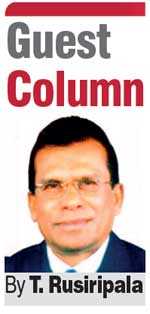Monday Feb 16, 2026
Monday Feb 16, 2026
Wednesday, 27 November 2019 08:25 - - {{hitsCtrl.values.hits}}
 |
 |
| Ranil Wickremesinghe | Sajith Premadasa |
The tussle between the Sajith factor and Ranil factor in the Parliament vying for the Leader of Opposition post is intensified and assuming grim dimensions – so much so that many have started contemplating a breakaway situation as imminent. 
Whatever the parochial political inclinations of promoters of such a move are, it is a pity if the grand old party breaks into two groups at this stage. Unlike the historical events where leading personalities decided to break away and form new political caucus, the current development in the UNP, if it materialises, is going to be a true polarisation where the rays may be separated, resulting in serious divergence, having different vibrations.
In the context of the actual anatomy of the party, its innate architecture is quite complex. The structure is per se dictatorial due to the bossy and autocratic domination of the party activities by its current leader.
The party majority is long used to a quite lenient disposition towards the decisions taken or dictated by the leader. The broader political outlook and policy commitments remained confined among a chosen few and almost all others subjugated unopposed. The rhetoric and frivolous stands on unimportant issues by those in the outer circle were indifferently disregarded and permitted by the inner circle to make them feel the satisfaction of some contribution of their own, while the core carried on their missions unnoticed
The party majority is long used to a quite lenient disposition towards the decisions taken or dictated by the leader. The broader political outlook and policy commitments remained confined among a chosen few and almost all others subjugated unopposed.
The rhetoric and frivolous stands on unimportant issues by those in the outer circle were indifferently disregarded and permitted by the inner circle to make them feel the satisfaction of some contribution of their own, while the core carried on their missions unnoticed.
Many unsuspecting juniors were collaborated into various exposures without much grandeur. All the while the centre was concentrating and adhering to a well-guided program dedicated to a commitment to standardise and rationalise the global economy to ensure a control and monopoly of the free market.
The leader was supportive and represented the interests in the establishment of a neo-liberal configuration for the State, facilitating at every given turn the global expansion of capital allowing the decision making to be vested with foreign interests. This seriously affected the independence and sovereignty of the nation while the others played the role of onlookers with innocent rationalisation, by attributing creditable motives to rather harmful acts.
As an example of this phenomenon I wish to quote how a very junior political figure of the UNP now identified with the Sajith camp openly declared at a recent TV debate where I too participated, stating that he advocated and authored the Vision 2025 program of the UNP with the help of HCID.
Perhaps he was unaware that this HCID, i.e. Howard University’s Center for International Development, was an institution financed by multi-million dollar currency speculator businessmen, George Soros. Perhaps he also did not know that George Soros advocates a new world order in which “sovereignty of states must be subordinated to international law and international institutions” while funding the so-called colour revolutions and regime change around the world!
This is a clear example of what the unsuspecting UNP juniors were subjected to by their masters. It was clear to few who looked at things incisively, but not clear to many gullible, where the party was leading to.
This trend in the UNP into a parting of ways surely will create two groups. One dictated by foreign dictums and another indigenous group on the line of thinking of the old leaders like DS, Dudley and Premadasa.
Now which group should be recognised as the main opposition alliance or party? Obviously when the UPFA forms the government and the largest alliance UNFGG does not contest against that position, the UNFGG should be the Opposition group out of the recognised parties which contested the election. The divisions in the UNP become immaterial because the speaker has to accept the parties and party groups that contested to get into the Parliament and not the individual components in the alliances
Besides this political dichotomy, there is another area of concern related to the selection of a leader of opposition in the Parliament. I wish to quote some writings by others about what is signified by “the leader of opposition” under a Westminster system of Parliament.
Some identify a leader of the opposition ‘as a member of the Council of States who is, for the time being, the Leader in that House of the party in opposition to the Government constituting the greatest numerical strength and recognised as such by the Chairman of the Council of States’.
According to the Indian Model the ‘Leader of the Opposition’ is identified as that member of the Lok Sabha or the Rajya Sabha who, for the time being, is the Leader of that House of the Party in Opposition to the Government having the greatest numerical strength and recognised, as such, by the Chairman of the Rajya Sabha or the Speaker of the Lok Sabha.
In the UK, “The Leader of the Opposition is a title traditionally held by the leader of the largest party not in government in a Westminster System of parliamentary government. The Leader of the Opposition is seen as the alternative Prime Minister, Premier or Chief Minister to the incumbent and heads a rival alternative government known as the Shadow Cabinet or Opposition Front Bench.”
“In US politics, the minority leader is the floor leader of the second largest caucus in a legislative body. Given the two-party nature of the US system, the minority leader is almost inevitably either a Republican or a Democrat. The position could be considered similar to that of the Leader of the Opposition in Parliamentary systems.”
Now let us take a look at the actual position of parties recognised in the Parliament of Sri Lanka. The current Parliament consists of members elected at the last General Election of the country on 17 August 2015. The configuration recognised parties by the Commissioner of Elections and successfully returned seats from their respective groupings and parties as indicated below;
1. United National Front for Good Governance an alliance of 11 different political parties; 106 seats
2. United Peoples’ Freedom Alliance comprising 17 different parties; 95 seats
3. Janatha Vimukthi Peramuna; 6 seats
4. Sri Lanka Muslim Congress; 1 seat
5. Eelam People’s Democratic Party; 1 seat
6. Tamil National Alliance comprising four different parties; 16 seats
Total number of seats in Parliament with the National List seats: 225
Now which group should be recognised as the main opposition alliance or party? Obviously when the UPFA forms the government and the largest alliance UNFGG does not contest against that position, the UNFGG should be the Opposition group out of the recognised parties which contested the election.
The divisions in the UNP become immaterial because the speaker has to accept the parties and party groups that contested to get into the Parliament and not the individual components in the alliances. In fact there is neither a UNP nor a SLFP that could be recognised by the Parliament. The question of SLPP which emerged as a separate political party subsequently does not arise at all.
Accordingly under the contemplated division within the UNP the numerical strength calculation should actually manifest as a division in the UNFGG and not only in the UNP for the purpose of Parliamentary recognition to decide on the position of a Leader of Opposition.
Will the Speaker uphold this principle stand or act in the manner how he chose to permit an impromptu confidence vote to oust Mahinda Rajapaksa presented by a member of the JVP?
The unprecedented large majority of the mandate given by the voters of the country in the election of Gotabaya Rajapaksa as the President of the country for a period of five years should be addressed with utmost respect in this instance.
The Parliament continuing with dates numbered should be allowed to continue till the first date it becomes eligible to be dissolved under the much criticised provisions of the 19th Amendment authored by the RW Government. The position of the leader of the opposition in the context will only be a redundant decoration in this very short-lived Parliament not worth fighting about.